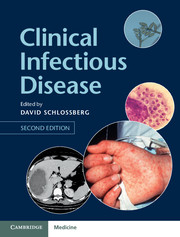Book contents
- Frontmatter
- Dedication
- Contents
- List of Contributors
- Preface
- Part I Clinical syndromes: general
- Part II Clinical syndromes: head and neck
- Part III Clinical syndromes: eye
- Part IV Clinical syndromes: skin and lymph nodes
- Part V Clinical syndromes: respiratory tract
- 29 Acute bronchitis and acute exacerbations of chronic airways disease
- 30 Croup, supraglottitis, and laryngitis
- 31 Atypical pneumonia
- 32 Community-acquired pneumonia
- 33 Nosocomial pneumonia
- 34 Aspiration pneumonia
- 35 Lung abscess
- 36 Empyema and bronchopleural fistula
- Part VI Clinical syndromes: heart and blood vessels
- Part VII Clinical syndromes: gastrointestinal tract, liver, and abdomen
- Part VIII Clinical syndromes: genitourinary tract
- Part IX Clinical syndromes: musculoskeletal system
- Part X Clinical syndromes: neurologic system
- Part XI The susceptible host
- Part XII HIV
- Part XIII Nosocomial infection
- Part XIV Infections related to surgery and trauma
- Part XV Prevention of infection
- Part XVI Travel and recreation
- Part XVII Bioterrorism
- Part XVIII Specific organisms: bacteria
- Part XIX Specific organisms: spirochetes
- Part XX Specific organisms: Mycoplasma and Chlamydia
- Part XXI Specific organisms: Rickettsia, Ehrlichia, and Anaplasma
- Part XXII Specific organisms: fungi
- Part XXIII Specific organisms: viruses
- Part XXIV Specific organisms: parasites
- Part XXV Antimicrobial therapy: general considerations
- Index
- References
29 - Acute bronchitis and acute exacerbations of chronic airways disease
from Part V - Clinical syndromes: respiratory tract
Published online by Cambridge University Press: 05 April 2015
- Frontmatter
- Dedication
- Contents
- List of Contributors
- Preface
- Part I Clinical syndromes: general
- Part II Clinical syndromes: head and neck
- Part III Clinical syndromes: eye
- Part IV Clinical syndromes: skin and lymph nodes
- Part V Clinical syndromes: respiratory tract
- 29 Acute bronchitis and acute exacerbations of chronic airways disease
- 30 Croup, supraglottitis, and laryngitis
- 31 Atypical pneumonia
- 32 Community-acquired pneumonia
- 33 Nosocomial pneumonia
- 34 Aspiration pneumonia
- 35 Lung abscess
- 36 Empyema and bronchopleural fistula
- Part VI Clinical syndromes: heart and blood vessels
- Part VII Clinical syndromes: gastrointestinal tract, liver, and abdomen
- Part VIII Clinical syndromes: genitourinary tract
- Part IX Clinical syndromes: musculoskeletal system
- Part X Clinical syndromes: neurologic system
- Part XI The susceptible host
- Part XII HIV
- Part XIII Nosocomial infection
- Part XIV Infections related to surgery and trauma
- Part XV Prevention of infection
- Part XVI Travel and recreation
- Part XVII Bioterrorism
- Part XVIII Specific organisms: bacteria
- Part XIX Specific organisms: spirochetes
- Part XX Specific organisms: Mycoplasma and Chlamydia
- Part XXI Specific organisms: Rickettsia, Ehrlichia, and Anaplasma
- Part XXII Specific organisms: fungi
- Part XXIII Specific organisms: viruses
- Part XXIV Specific organisms: parasites
- Part XXV Antimicrobial therapy: general considerations
- Index
- References
Summary
Bronchial infections with viral and bacterial microorganisms cause considerable morbidity, as well as economic costs incurred through health care and loss of productivity. These infections affect all age groups. An important consideration is whether or not an individual has underlying chronic lung disease, as that alters the etiology, clinical presentation, laboratory findings, and indications for therapy. In this chapter, we discuss acute infectious bronchitis in individuals without underlying chronic lung disease, before outlining approaches when an individual has an acute exacerbation of a chronic lung disease such as asthma, chronic obstructive pulmonary disease (COPD), or non-cystic fibrosis bronchiectasis.
ACUTE BRONCHITIS
Acute bronchitis is a common condition in both children and adults. It has been defined as “an acute illness, occurring in a patient without chronic lung disease, with symptoms including cough, which may or may not be productive and associated with other symptoms or clinical signs that suggest LRTI [lower respiratory tract infection] and no alternative explanation (e.g., sinusitis or asthma).” Most people will experience this at some time during their lives, and in most cases it is self-limiting and will not result in those affected seeking medical attention.
Nonetheless, this condition is a frequent cause of attendance to primary care providers and has been identified as a potential target for reducing unnecessary antibiotic prescribing in the community. Additionally, those who seek medical care for acute bronchitis, especially if this is frequent, should be considered for investigation as to whether or not they have an underlying chronic airways disease.
- Type
- Chapter
- Information
- Clinical Infectious Disease , pp. 193 - 198Publisher: Cambridge University PressPrint publication year: 2015



